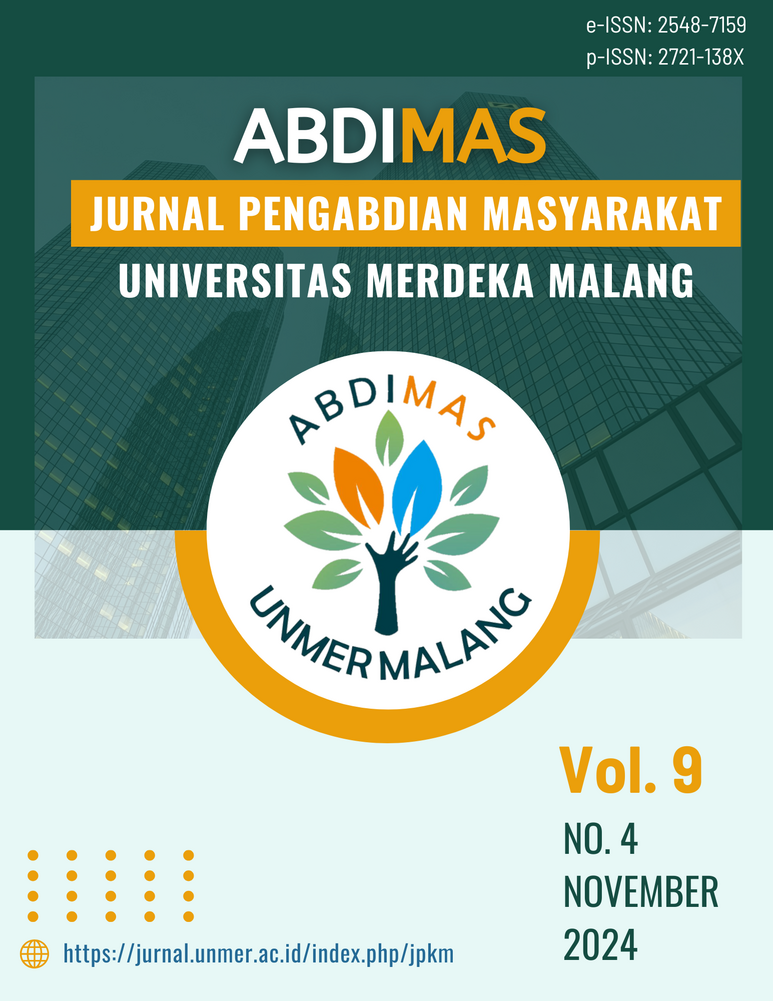Cash waqf crowdfunding model as a source of business capital for Kelompok Usaha Warung Sejahtera
DOI:
https://doi.org/10.26905/abdimas.v9i4.14256Keywords:
Crowdfunding, Waqf, Cash, Capital, MSMEsAbstract
Micro, Small, and Medium Enterprises (MSMEs) play a crucial role in Indonesia's economy, contributing significantly to the Gross Domestic Product (GDP) and providing 96.87 percent of the employment opportunities. Despite their continued growth, particularly in Tanjung Priok, MSMEs face challenges, especially in accessing capital. The Warung Sejahtera Business Group in Tanjung Priok exemplifies micro-enterprises struggling with capital limitations, market access, and a lack of digital and managerial knowledge. The community service activities focus on improving access to capital through crowdfunding waqf in collaboration with SatuWakaf Indonesia, leveraging untapped cash waqf potential to strengthen MSME production capital and stimulate local economic growth. The method used is Participatory Action Research (PAR), involving 34 participants. Pretest and post-test analyses showed a 53.17 percent average increase in understanding of waqf and SatuWakaf as alternative funding sources. The community service team has initiated cooperation with SatuWakaf Indonesia, providing initial guidance to partners on accessing waqf- based capital and creating opportunities for further collaboration. In addition, this community service activity contributed to the establishment of a cash waqf nazir institution, this institution can be a place for cash waqf crowdfunding to help meet the capital needs of MSMEs.
Downloads
References
Alfrian, G. R., & Pitaloka, E. (2020). Strategi Usaha Mikro, Kecil, dan Menengah (UMKM) bertahan pada kondisi pandemik Covid 19 di Indonesia. Prosiding Seminar Nasional Terapan Riset Inovatif (SENTRINOV), 6(2), 139-146.
Badan Pusat Statistik. (2024). Jumlah penduduk (Jiwa), 2019-2022. Badan Pusat Statistik.
Badan Wakaf Indonesia (BWI). (2023). Indeks wakaf nasional 2022. Badan Wakaf Indonesia.
Diniyah, F. (2021). Faktor yang mempengaruhi niat perilaku muslim menggunakan platform crowdfunding waqf: Teori UTAUT model. Jurnal Ilmiah Ekonomi Islam, 7(2), 544-552. https://doi.org/10.29040/jiei.v7i2.1841
Huda, N., Anggraini, D., Rini, N., Hudori, K., & Mardoni, Y. (2014). Akuntabilitas sebagai sebuah solusi pengelolaan wakaf. Jurnal Akuntansi Multiparadigma, 5(3), 485-497. https://doi.org/10.18202/jamal.2014.12.5036
Huda, N., Rini, N., Mardoni, Y., Anggraini, D., & Hudori, K. (2016). Manajemen pengelolaan wakaf di Indonesia Timur. EKUITAS (Jurnal Ekonomi dan Keuangan), 20(1), 1-17. https://doi.org/10.24034/j25485024.y2016.v20.i1.35
Lacerenza, C. N., Reyes, D. L., Marlow, S. L., Joseph, D. L., & Salas, E. (2017). Leadership training design, delivery, and implementation: A meta-analysis. Journal of Applied Psychology, 102(12), 1686–1718. https://doi.org/10.1037/apl0000241
Mollick, E. (2014). The dynamics of crowdfunding: An exploratory study. Journal of Business Venturing, 29(1), 1–16. https://doi.org/10.1016/j.jbusvent.2013.06.005
Noerhidajati, S. (2023). Pengelolaan wakaf uang: Usulan skema pembiayaan Usaha Mikro, Kecil dan Menengah. Syarikat: Jurnal Rumpun Ekonomi Syariah, 6(1), 74-90. https://doi.org/10.25299/syarikat.2023.vol6(1).10691
Qomar, M. N., Karsono, L. D. P., Aniqoh, F. Z., Aini, C. N., & Anjani, Y. (2022). Peningkatan kualitas umkm berbasis digital dengan Metode Participatory Action Research (PAR). Community Development Journal: Jurnal Pengabdian Masyarakat, 3(1), 74-81. https://doi.org/10.31004/cdj.v3i1.3494
Rofi’i, M., Huda, N., Gani, A. N., Hamdani, L., & Rahmasuciana, D. Y. (2023). Peningkatan pemahaman pengelolaan koperasi bagi pengurus koperasi simpan pinjam dan pembiayaan syariah. Jurnal Inovasi Hasil Pengabdian Masyarakat (JIPEMAS), 6(3), 652–664. https://doi.org/10.33474/jipemas.v6i3.19423
Rusydiana, A., & Rahayu, S. S. (2019). Bagaimana strategi pengembangan wakaf tunai di Indonesia? Jurnal Ekonomi dan Bisnis Islam (Journal of Islamic Economics and Business), 5(1), 15–33. https://doi.org/10.20473/jebis.v5i1.10416
Suhaili, N. A., & Palil, M. R. (2016). Crowdfunding: A collaborative waqf based internet platform. International Journal of Business, economics and law, 11(5), 41-46.
Sulistiani, S. L., Fawzi, R., & Nurrachmi, I. (2023). Waqf crowdfunding model in post-pandemic economic improvement according to Islamic Sharia and National Law. Amwaluna: Jurnal Ekonomi dan Keuangan Syariah, 7(1), 73-81. https://doi.org/10.29313/amwaluna.v7i1.10130
Sulistyani, D., Asikin, N., Soegianto, S., & Sadono, B. (2020). Pelaksanaan dan pengembangan wakaf uang di Indonesia. Jurnal USM Law Review, 3(2), 328-343. http://dx.doi.org/10.26623/julr.v3i2.2874
Thaker, M. A. M. T., Thaker, H. M. T., & Pitchay, A. A. (2018). Modeling crowdfunders’ behavioral intention to adopt the crowdfunding-waqf model (CWM) in Malaysia: The theory of the technology acceptance model. International Journal of Islamic and Middle Eastern Finance and Management, 11(2), 231-249. https://doi.org/10.1108/IMEFM-06-2017-0157
Windusancono, B. A. (2021). Upaya percepatan pertumbuhan Usaha Mikro Kecil dan Menengah (UMKM) di Indonesia. Mimbar Administrasi Fisip Untag Semarang, 18(1), 01-14. http://dx.doi.org/10.56444/mia.v18i2.2528
Yolanda, C. (2024). Peran Usaha Mikro, Kecil Dan Menengah (UMKM) dalam pengembangan ekonomi Indonesia. Jurnal Manajemen dan Bisnis, 2(3), 170–186. https://doi.org/10.36490/jmdb.v2i3.1147
Zidane, M. R., Ati, N. U., & Ilyas, T. R. (2024). Peran dinas koperasi, perindustrian, dan perdagangan Kota Malang dalam pengembangan UMKM di Kota Malang (Studi Kasus di Sentra Industri Keripik Tempe Sanan, Kota Malang). Respon Publik, 18(2), 93-99.
Downloads
Published
How to Cite
Issue
Section
License
Copyright (c) 2024 Abdimas: Jurnal Pengabdian Masyarakat Universitas Merdeka Malang

This work is licensed under a Creative Commons Attribution-ShareAlike 4.0 International License.
Authors who publish with this journal agree to the following terms:
- Copyright of the published articles will be transferred to the journal as the publisher of the manuscripts. Therefore, the author confirms that the copyright has been managed by the journal.
- Publisher of Abdimas: Jurnal Pengabdian Masyarakat Universitas Merdeka Malang is University of Merdeka Malang.
- The copyright follows Creative Commons Attribution-ShareAlike License (CC BY SA): This license allows to share, copy, and redistribute the material in any medium or format, adapt, remix, transform, and build upon the material, for any purpose, even commercially.





